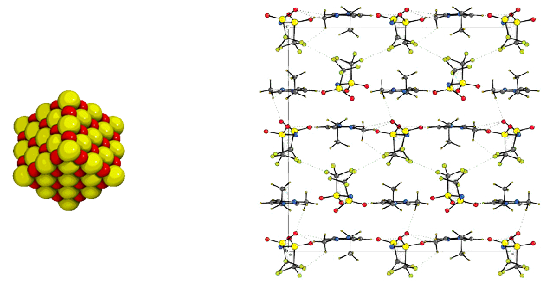Performance and Synthesis of Ionic Liquid
Ionic Liquids
Ionic liquids (ILs) are compounds that consist entirely out of ions. In contrast to molten salts, ILs are defined by a melting point below 100 °C. While NaCl is a high melting solid (mp = 803 °C) which is quite corrosive in the liquid state, ionic liquids consists of ions with a high degree of charge delocalization and a low degree of symmetry resulting in much lower melting points (some candidates down to -20 °C).

Ionic liquids are considered as green alternatives to volatile organic solvents due to their extremely low vapor pressures (in the range of metals). More relevant is however the fact that ILs represent a class of liquid materials with unique property profiles, such as combinations of wide liquidus range, electric conductivity, good electrochemical and thermal stability, excellent tribological properties as well as special solubility and coordination properties. For our group, the ability of ionic liquids to dissolve homogeneous transition metal catalysts, to stabilize catalytic nanoparticles or to modify the surface of classical heterogeneous catalysts is of special relevance.

The development of ionic liquids dates to the early 20th century when Hurley and Wier developed the first ionic liquids containing chloroaluminate ions for the electroplating of aluminium in 1948. In the late 1980s, chloroaluminate melts were used as non-aqueous polar solvents for the observation of transition metal complexes in the research groups of Seddon and Hussey. This period also saw the first publications of ionic liquids as novel reaction media and catalysts for organic syntheses.
Ionic liquids (ILs) are used at the chemical reaction engineering chair (CRT) in various fields of chemistry, including catalysis. Beside two-phase systems, in which the IL serves as catalyst and extraction agent, ionic liquids are also used in catalysis as SILP (Supported Ionic Liquid Phase) and SCILL (Solid Catalyst with Ionic Liquid Layer):
- SILP (Supported Ionic Liquid Phase): SILP is a concept in which an ionic liquid with a homogeneous catalyst dissolved in it is immobilized on a support material. For example, the support material can be a porous substance such as activated carbon, silica gel, or other material that provides a high surface area. Immobilizing the ionic liquid and catalyst on the support material allows the advantages of the homogeneous catalyst in terms of high activity and selectivity in catalysis, while facilitating the separation of the catalyst phase from the reaction mixture. This allows easy separation of the catalyst and reuse.
- SCILL (Solid Catalyst with Ionic Liquid Layer): SCILL is a concept in which a heterogeneous catalyst is coated with a thin layer of an ionic liquid. This ionic liquid layer can serve as a reaction environment and improve the activity and selectivity of the catalyst. By using an ionic liquid layer, reactions can often be carried out under milder conditions.
Both SILP and SCILL have advantages such as improved catalyst stability, increased catalyst efficiency, improved product selectivity, and easier separation of the catalyst from the reaction mixture. These concepts have the potential to find application in various catalytic processes, such as the production of fine chemicals or biomass conversion.